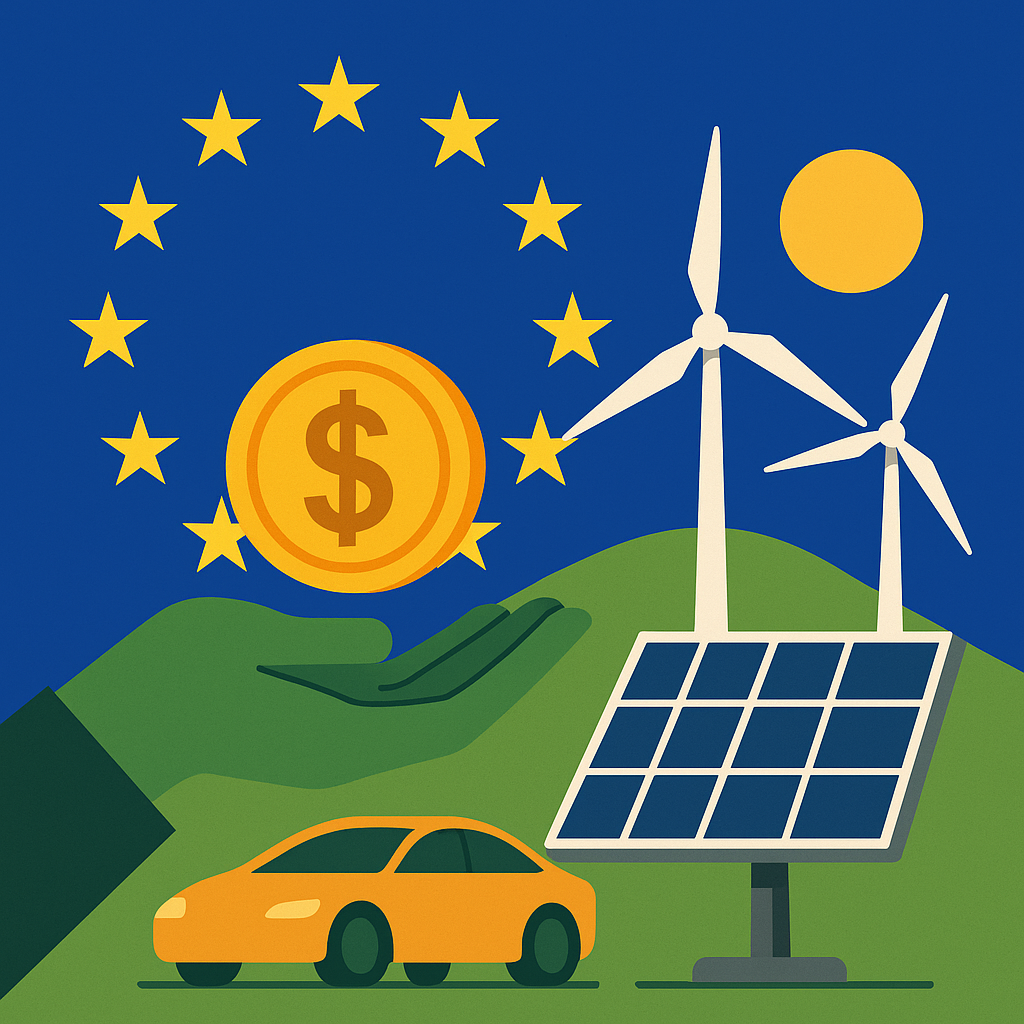In a pivotal policy pivot, the European Union has signaled a shift away from traditional subsidy models in favor of direct public equity investment to support the growth of clean-energy industries. EU Competition Commissioner Margrethe Vestager stated this week that Europe must “think bigger” and embrace market-based tools to support solar, wind, battery, and hydrogen sectors—not just by writing checks, but by becoming a strategic shareholder.
This approach could fundamentally reshape how clean-tech companies in the EU are capitalized, and how private capital participates in the bloc’s transition to a low-carbon economy.
Why Investors Are Paying Attention
Unlike the U.S. Inflation Reduction Act, which showers clean-tech with tax credits and subsidies, the EU is now focused on providing legal and financial certainty to investors by putting public capital directly into projects and startups via equity stakes.
In her comments to Bloomberg (June 24, 2025), Vestager emphasized that public equity signals long-term commitment and governance stability—two factors that large private investors often cite as missing in European climate funding frameworks.
The EU’s move comes amid increasing concerns that its clean-energy innovation is lagging behind the U.S. and China, where more flexible financial ecosystems have led to massive capital inflows. European officials now see equity participation, not just grants or subsidies, as a way to leverage private capital more effectively.
Strategic Shift Toward Market-Based Clean-Tech Growth
Public equity investments could take the form of:
- EU-level climate funds with mandates to co-invest alongside VCs and institutional investors
- Green sovereign wealth fund expansions
- Public financial institutions (like the European Investment Bank) taking minority stakes in promising startups
The EU has already launched initiatives like the Innovation Fund and InvestEU, but this new approach marks a strategic upgrade: from being a funding backstop to being a partner in equity.
According to McKinsey & Company’s 2025 Clean Energy Capital Markets Report, Europe will need over €800 billion in clean-tech investment annually through 2030 to meet climate targets. Public equity investments could provide the anchoring capital needed to attract venture and institutional capital at scale.
What This Means for Investors
1. Legal Certainty Over Subsidy Volatility
Equity investments, by nature, offer greater regulatory stability and alignment of interests than subsidies, which can be revised, capped, or withdrawn. This move helps de-risk capital deployment for long-horizon funds.
2. New Climate-Focused Investment Vehicles
Expect the rise of blended-finance structures, where public capital de-risks private investment through minority equity stakes. This opens opportunities for climate-aligned ETFs, ESG-focused private equity, and co-investment syndicates.
3. Increased Valuation Support for EU Clean-Tech Firms
Public participation in early-stage equity rounds will likely increase valuations, extend runways, and improve access to debt markets for European clean-tech companies. This may level the playing field with U.S. and Chinese peers, helping Europe retain strategic industries.
Credible Sources and Market Signals
- Bloomberg, “Vestager Urges Public Equity Investment Over Subsidies,” June 24, 2025
- European Commission, “Strategic Technologies for Europe Platform (STEP) Update,” Q2 2025
- McKinsey & Company, “Capital Markets Outlook for Clean Energy 2025–2030”
- European Investment Bank, “Green Investment Priorities and Public-Private Partnerships”
Key Investment Insight
Investors looking at Europe’s clean-tech landscape should recalibrate their risk models to reflect state-backed equity support rather than dependency on uncertain subsidies.
Key areas of opportunity:
- Solar and battery tech startups likely to benefit from equity injection models
- Public-private green infrastructure funds with low-volatility co-investment opportunities
- Legal-regulatory advisory services and ESG-aligned asset managers poised to benefit from structural clarity in capital flows
Watch for further announcements on equity fund launches, EU Green Deal financing mechanisms, and cross-border public-private partnerships, especially as the bloc prepares for a new wave of strategic green tech initiatives under its revised 2030 Climate Agenda.
Stay tuned to MoneyNews.Today for deep analysis, credible insights, and daily coverage of policy shifts that move markets and shape long-term investor strategies.





